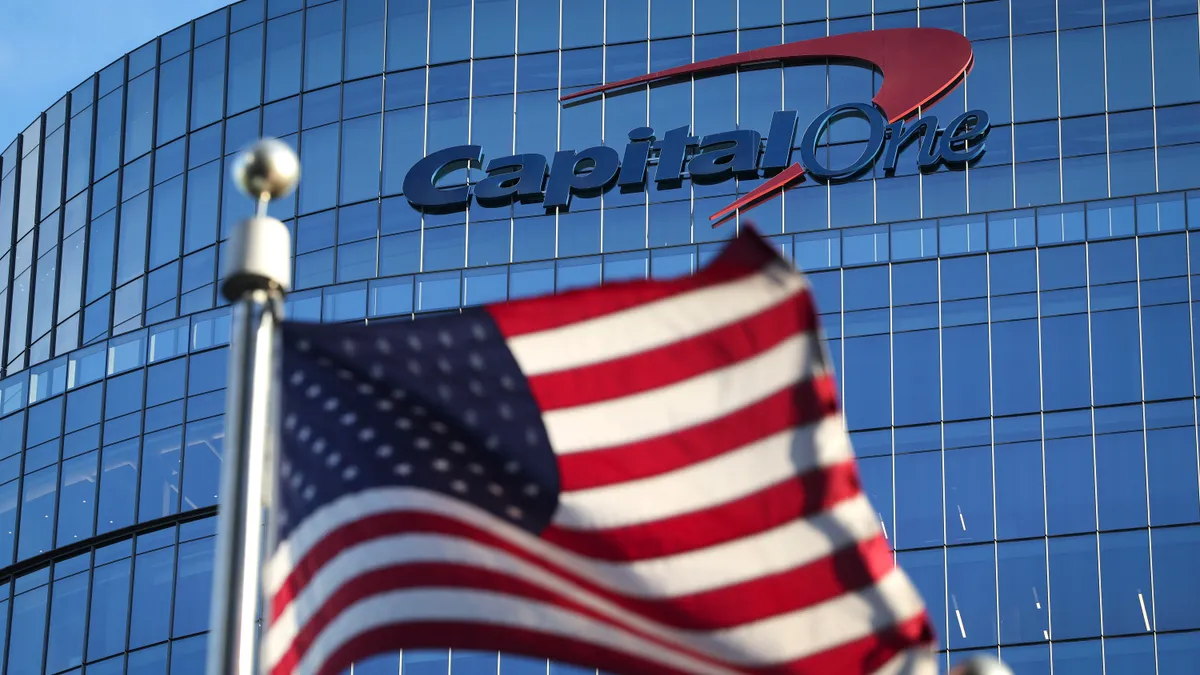Dive Brief:
- The New York City Banking Commission voted Thursday to suspend deposits at Capital One and KeyBank after the banks failed to submit anti-discrimination plans.
- New York City Comptroller Brad Lander, one of three members of the commission, also voted against allowing Wells Fargo, PNC and International Finance Bank to hold public funds after they, too, failed to submit anti-discrimination plans.
- In a public hearing, the commission designated 26 banks to receive deposits from city agencies for the next two years. Despite the move against Capital One and KeyBank, those two banks can service existing contracts for one year.
Dive Insight:
Capital One held $7.2 million in city deposits at the end of April across 108 accounts. Meanwhile, KeyBank, which had $10 million in city deposits across three accounts at the end of April, “outright refused to submit required policies,” the the commission said in a Thursday statement.
“Despite several opportunities to do so, five banks failed to comply with the New York City Banking Commission’s designation process — leaving us to conclude that they are not taking meaningful actions to combat discrimination in their operations and are not responsible stewards of public dollars,” Lander said.
Lander was not joined by the commission’s two other members in voting against Wells, PNC and International Finance Bank.
“Banks seeking to do business with New York City must demonstrate that they will be responsible managers of public funds and responsible actors in our communities,” Lander said.
The National Community Reinvestment Coalition praised the banking commission for including public comments in the process.
“KeyBank and Capital One have atrocious track records of not just under-serving but actively harming the interests of low-wealth communities and people of color,” CEO Jesse Van Tol said in a statement Thursday.
KeyBank this month agreed to engage in a third-party racial equity audit, weeks after fair-lending groups and 80 community organizations asked federal regulators for an investigation into alleged redlining in the bank’s mortgage lending practices.
A KeyBank spokesperson told American Banker the bank did not discriminate during its operations and that it does not currently hold deposits with New York City. The spokesperson also said the bank supplied the necessary information to the banking committee.
“This is a misunderstanding and we look forward to clarifying this issue with the Banking Commission,” the spokesperson said in an email to the publication.
A Capital One spokesperson told Ameican Banker it does not encourage discrimination against employees and clients, adding that what it submitted to city officials was “consistent” with past materials.
This is not the first time Wells Fargo has found itself on the outs with Lander. Lander and Mayor Eric Adams wrote Wells CEO Charlie Scharf in April 2022, after New York City officials vowed not to open any new depository accounts with the bank over a Bloomberg report that found the bank approved less than half of refinance applications from Black homeowners in 2020 but 72% from white borrowers.
“We are ready to continue serving [the city’s] needs today and well into the future,” a Wells Fargo spokesperson told American Banker in an email.
PNC and International Finance Bank did not respond to requests for comment by the publication.
The commission in February tightened its rules to make designated banks more accountable to the public by asking banks to provide detailed plans and specific steps to combat lending and employment discrimination.
Banks are expected to provide approved banking products and services for city entities and must provide total collateralization for any money held.
“The ability to hold and profit from New Yorkers’ hard-earned city deposits is a privilege, not a right,” Barika X. Williams, executive director of the Association for Neighborhood and Housing Development, said in a statement in February.
Annie Levers, the city’s deputy comptroller for policy, raised public concern over taxpayers' money being used for fossil-fuel extraction and gun manufacturing and asked the public funds to be put into community work.
“The perspectives we heard today from New Yorkers who experienced discrimination in the process of opening or closing accounts, and frontline bank staff who faced illegal and abusive practices, should give all of us pause,” Levers said Thursday.














